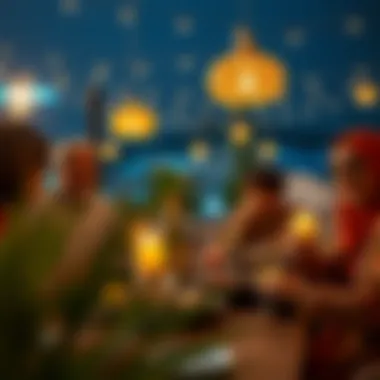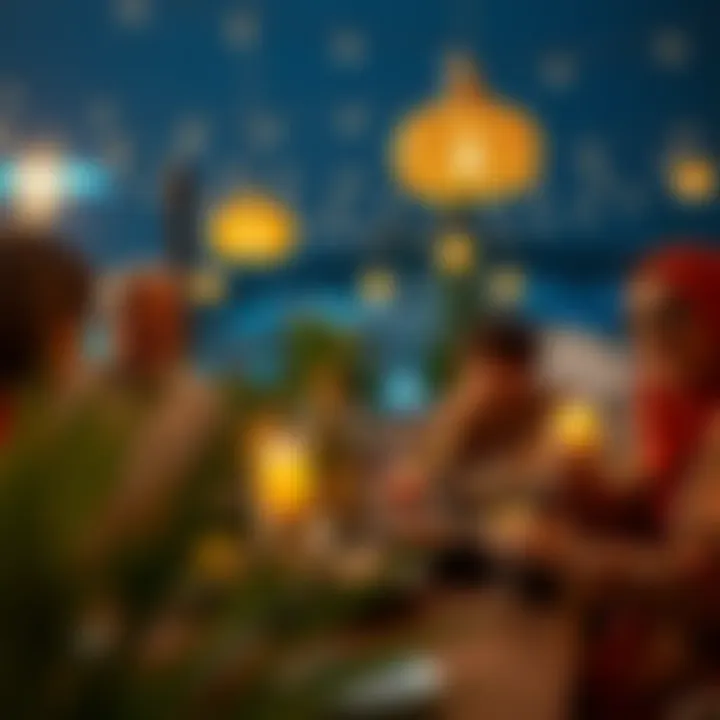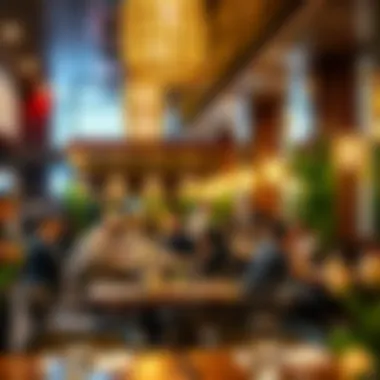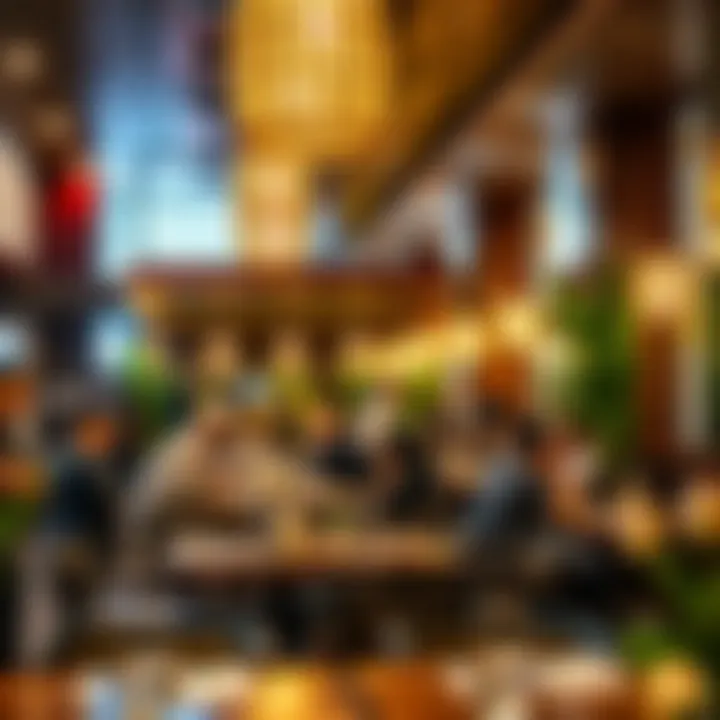Iftar Time 2023 in Dubai: Insights and Impact


Intro
As the holy month of Ramadan approaches, the atmosphere in Dubai begins to shift, characterized by a mix of anticipation and a deep respect for tradition. Observing the daily fast culminates in the sacred moment of iftar, marking the breaking of that fast at sunset. In 2023, iftar in Dubai carries not just spiritual significance but also a fascinating impact on the local dynamics, particularly in real estate and business sectors. This comprehensive guide aims to navigate you through everything related to iftar, from the cultural practices surrounding this cherished event to its far-reaching implications.
The reverberations of iftar extend beyond the dining tables. They touch upon the investment landscape, influencing how businesses operate and even how communities engage. With Dubai being a melting pot of cultures, the way iftar is celebrated reflects the emirate's diversity, fostering unity among people from various backgrounds. This rich tapestry of cultural practices is intertwined with the economic and residential fabric of Dubai, marking a profound connection worth exploring.
We will delve into the Market Analysis, shedding light on how iftar influences recent trends in the property market and the broader economy. Following that, Investment Opportunities will be highlighted, painting a picture for those looking to invest wisely during this vibrant season. Prepare to enrich your understanding of how this multifaceted occasion shapes not only lives but also the landscape of investment and real estate in Dubai.
"Ramadan is not just a month; it's a way of understanding our connection to God, our community, and our economy."
Buckle up as we uncover the layers of iftar in Dubai for 2023, revealing insights that resonate with investors, businesses, and residents alike, all while honoring the traditions that make this city truly unique.
Preamble to Iftar in Dubai
The sacred and joyous observance of Iftar in Dubai holds a prominent place in the cultural fabric of the emirate. As the sun dips below the horizon, families and friends gather to break their fast, symbolizing not just the end of the daily fast but also the beginning of a communal experience steeped in tradition and warmth. This article delves deep into the nuances of Iftar time in Dubai for 2023, accentuating its significance in both religious and social contexts, while exploring how this cultural phenomenon impacts various sectors, including local businesses and real estate.
Understanding Iftar
Iftar marks the moment during Ramadan when Muslims break their fast at sunset. This practice involves a variety of foods, commonly starting with dates and water, followed by more substantial dishes that differ across households. The experience of Iftar transcends mere sustenance; it serves as a time for reflection, gratitude, and the celebration of community bonds. In a city as dynamic as Dubai, Iftar is also a cornerstone for business and social interactions that can influence community dynamics.
Cultural Importance of Iftar
Beyond the logistical aspects, Iftar is a cultural touchstone in Dubai, deeply rooted in the Islamic faith while simultaneously embracing the city's multicultural landscape. The melting pot of Dubai’s population contributes to a unique tapestry of Iftar practices, where flavors from various cuisines combine to create a vibrant, culinary showcase. It is a time when the community stands united, promoting tolerance and understanding amongst diverse groups.
"Iftar is the heartbeat of Ramadan in Dubai, resonating through the cityscape, from luxurious hotels to humble homes. It's about nourishment of the body and soul, connecting people through shared rituals."
Notably, local businesses often capitalize on the Iftar period, offering special menus and catering services that reflect both tradition and innovation. This not only enhances the dining experience but also stimulates the local economy, creating opportunities for investors and entrepreneurs. In this sense, Iftar is not just a personal experience but a communal one that strengthens both social and economic ties, marking its importance in the contemporary fabric of Dubai life.
Historical Context of Iftar in Dubai
Understanding the historical context of Iftar in Dubai adds layers to its significance, intermingling culture, tradition, and change over time. As Dubai evolves, so do its social practices, which can be reflected especially during the holy month of Ramadan. Observing Iftar not only serves as a daily routine for breaking the fast but also acts as a cultural mirror, reflecting the social fabric of a fast-paced city with deep roots in Islamic history. It's vital for investors and developers to grasp how this context influences community values and dining experiences throughout the city, impacting both lifestyle and business.
Evolution of Iftar Traditions
The evolution of Iftar traditions in Dubai is shaped by a confluence of historical influences, from the region’s Bedouin heritage to contemporary urbanization. Originally, Iftar was a modest meal, often consisting of dates and water before moving on to a more substantial spread, often prepared at home or shared amongst neighbors. Traditionally, families would come together, sharing dishes as a means to bond and reinforce familial ties.
In modern times, the Iftar experience has transformed significantly. Larger gatherings have shifted from intimate settings in homes to lavish banquets in hotels and restaurants. The culinary landscape has widened, introducing diverse international cuisines that cater to an increasingly cosmopolitan population. Special Iftar menus featuring a fusion of local and global flavors are now commonplace.
"Traditions grow and change; it's a sign of a living culture."
This cultural dynamism creates opportunities for investors, particularly in the hospitality sector, as demand for unique dining experiences rises during Ramadan. Establishments such as Bice Mare and Al Fanar tune into this shift by curating exclusive Iftar packages that reflect tradition while offering innovative tastes, thus appealing to both locals and tourists alike. These modern-day practices emphasize how the essence of Iftar remains deeply rooted in community connections, albeit expressed through a more contemporary lens.
Ramadan and Its Influence on Dubai's Culture
Ramadan deeply influences Dubai's culture, structuring daily life around fasting and prayer, which in turn shapes community interactions and business operations. This month is not only a test of personal discipline but also a time for social cohesion. The act of breaking fast together fosters strong community relationships and highlights charitable values as families often open their doors or set up communal Iftar gatherings to share food with those less fortunate.
In the context of real estate and investment, Ramadan serves as a pivotal moment, triggering a unique market rhythm. Businesses gear up for increased footfall during Ifatr hours, resulting in heightened demand for temporary dining areas and pop-up kitchens. The essence of Ramadan draws families to specific neighborhoods known for their vibrant Iftar scenes, such as Old Dubai and Deira.
As an investor or developer, understanding these cultural nuances is crucial for aligning products and services with local customs. The essence of Ramadan also encourages initiatives like community clean-ups and charity drives, underscoring a collective ethos that can attract new residents and elevate property values in a neighborhood.
The interlacing of Iftar with both historical and cultural dimensions reveals how deeply it resonates within the community dynamics in Dubai. The significance of those breaking bread together during this sacred time can't be overstated; it stands as a testament to a society that values tradition while embracing modernity.
Iftar Time for in Dubai
Understanding the specific timing of iftar during Ramadan is essential not just for worshippers, but also for businesses and communities across Dubai. As the sun sets, thousands of individuals and families gather to break their fast. This communal event creates a rhythm in the air that resonates with the rich traditions of the emirate, echoing a unified sentiment during the holy month.
The significance of being aware of the exact iftar time lies in its impact on planning daily activities. Businesses, whether they range from quaint eateries to large restaurants, usually schedule opening hours around this time to cater to the surge of customers ready to feast. For the people, knowing when to break their fast means more than just the filling of stomachs; it's about participating in a sacred ritual that fosters togetherness and reflection.
Official iftar Time Listings


In 2023, the official iftar times in Dubai vary slightly, depending on the day. Generally, the iftar time will be close to 6:40 PM or 6:45 PM near the end of the month, but it's crucial to consult local religious authorities or trusted websites for the most accurate timings. Many mosques and community centers often distribute these official timings, and there are apps specifically designed to provide up-to-date iftar times based on location.
Relying on accurate time listings is especially important for those observing fasting. Missing the iftar call can lead to unnecessary stress, causing disruption in a day that should be filled with peace and gratitude. Additionally, establishments may advertise special menus or deals at iftar, and knowing the precise timing ensures you won’t arrive too early or too late.
Variances Across Neighborhoods
Peculiarly, the iftar time can differ slightly as you traverse various neighborhoods due to varying sunset times. For instance, areas closer to the coastline like Jumeirah might observe iftar a few minutes later than more inland locales like Deira. Such variances force one to be mindful of their surroundings and the communities that they belong to.
You might find that local eateries in neighborhoods like Al Quoz or Dubai Marina push back their iftar specials to accommodate slight timing changes. It's truly remarkable how simply moving from one area to another can create a profound difference in the community’s daily rhythms. This subtlety encourages residents and visitors to explore different neighborhoods during Ramadan, discovering unique iftar experiences.
Important Reminders:
- Make a habit of checking iftar times regularly—timings can change daily.
- Consider the impact of neighborhood variance; adjust your plans accordingly.
- Engage with locals to share in cultural practices and possibly uncover hidden gems for iftar.
To assist in your planning, consider utilizing resources like the Emirates Islamic website or the Dubai Islamic Affairs and Charitable Activities Department to stay updated or view listings:
By acknowledging these variations and the official iftar listings, one can seamlessly navigate the festive atmosphere in Dubai during Ramadan.
The Role of Local Businesses During Iftar
As the sun dips below the horizon during Ramadan, the vibrancy of life in Dubai is reignited, particularly through the lens of local businesses engaging in Iftar. This observance, more than merely a meal to break the fast, creates an entire ecosystem fostering community bonds and business opportunities. Local businesses have an integral role in this period, offering traditional and innovative dining experiences that resonate with both residents and visitors alike.
Restaurants and Iftar Specials
With the arrival of Iftar, restaurants across Dubai pull out all the stops to attract diners looking to indulge after a day of fasting. Many establishments, especially those like Al Fanar Restaurant & Cafe, curate special Iftar menus that showcase the rich tapestry of Emirati cuisine. The essence of Iftar in these venues isn’t just the food served; it’s about creating an atmosphere that embodies hospitality and warmth.
In 2023, you can expect a multitude of options:
- Buffet Style Offerings: Highlights include mouth-watering dishes ranging from hearty lamb dishes to fragrant biryanis, ensuring there is something for every palate.
- Interactive Dining Experiences: Many restaurants introduce live cooking stations where patrons can engage with chefs and even customize their meals, making the dining experience personal and engaging.
- Special Discounts and Promotions: Some places provide attractive deals for families or large groups, incentivizing communal dining.
The growing trend of delivering Iftar meals direct to homes is also a notable shift in how restaurants adapt to consumer preferences. Especially during the recent pandemic events, this sector has thrived by providing safe, convenient dining experiences right to one’s doorstep. The demand for quality catering services during Ramadan is soaring.
Catering Services and Demand
With the strong demand for Iftar gatherings, catering services have become pivotal in fulfilling this community need. Families often seek to host large Iftar events, whether at home or community venues, which transforms catering into a thriving business model during this holy month.
The catering landscape is marked by:
- Home-Cooked Meal Services: Many individuals prefer catering services that offer authentic, home-cooked style meal options rather than typical restaurant fare. This has opened doors to small-scale businesses and home cooks who can now scale their operations through referrals and online platforms.
- Corporate Events: Companies are increasingly sponsoring Iftar gatherings for employees, allowing catering services to expand their offerings to include corporate packages that feature balanced meals suitable for large groups.
- Health-Conscious Options: As people become more aware of nutritional needs, catering services are also diversifying their menus to incorporate healthy choices, such as plant-based dishes and low-calorie meals, ensuring that everyone finds a suitable option.
Investing in local businesses during Ramadan can yield benefits beyond profit; it's about participating in a holistic experience that enriches the community while driving economic growth.
For more on this subject, consider exploring resources such as Wikipedia on Ramadan or Britannica.
Local trends and consumer preferences can also be examined through platforms like Reddit and social networks like Facebook.
Overall, the interaction between local businesses and the Iftar observance illustrates a unique blend of cultural significance and economic viability, vital for investors and community members alike.
Impact of Iftar on the Property Market
The relationship between Iftar during Ramadan and the property market is not just a coincidence; it’s intertwined in ways that can be quite enlightening. When the sun dips below the horizon and families gather to break their fast, the resultant community spirit can trigger significant changes in local economies and real estate. Investors, realtors, and potential buyers should pay attention to these dynamics, as they unveil market prospects that might otherwise go unnoticed.
Real Estate Trends During Ramadan
During Ramadan, one tends to see a shift in market behavior, largely influenced by Iftar. For starters, community gatherings become a frequent sight, leading to increased interest in properties within accessible locations. Homebuyers, especially families, lean toward neighborhoods with vibrant community events and amenities, resulting in a noticeable uptick in demand.
- Increased Demand for Rentals: Many expatriates seek temporary accommodations during Ramadan. Short-term rentals also see a boost as people look for places that facilitate their Iftar rituals.
- Property Value Appreciation: Areas that proudly showcase Ramadan decor and host community Iftar events generally see an uptick in property values. The notion is simple: a lively neighborhood attracts higher property prices.
- Commercial Realty Insights: With restaurants and catering services gearing up for the rush, commercial spaces in prime locations witness increased interest. Investors might consider properties that can accommodate such businesses, given the rise in foot traffic.
Importantly, as families gather for these evening meals, many real estate professionals report a surge in inquiries about properties in well-connected areas, showing how these cultural practices can directly influence market trends.


Investment Opportunities Arising From Iftar Gatherings
Special attention should be paid to the investment opportunities stemming from the communal nature of Iftar. It’s often said that business thrives on good relationships, and during Ramadan, these connections flourish.
- Engaging Local Businesses: Catering services find a booming business opportunity during Ramadan, specifically tailored towards Iftar offerings. Developers and investors who focus on commercial properties accommodating these services are likely to benefit significantly.
- Creating Shared Spaces: It’s increasingly popular for developers to design community spaces where local Iftar gatherings occur, enhancing community spirit while providing profit avenues for property owners.
- Event Hosting Venues: As iftar gatherings get larger, the need for venues to host these events arises. Investors can look into transforming spaces into venues that can cater for community events during Ramadan, thus diversifying their investment portfolio.
"Iftar gatherings offer a glimpse into the market trends that many investors often overlook. By focusing on community engagement during Ramadan, we can uncover unique opportunities that can lead to substantial rewards in the property sector."
Residential Communities and Iftar
In Dubai, the significance of Iftar stretches well beyond personal observance; it captivates entire residential communities. As families and individuals break their fast together, the sense of camaraderie and shared tradition fosters a strong community spirit. This article explores how gated communities and residential areas immerse themselves in Iftar observances, highlighting initiatives specifically designed to promote social engagement among residents.
Iftar Initiatives in Gated Communities
In gated communities throughout Dubai, the longing for connection during Ramadan leads to numerous Iftar initiatives. These can be seen as an attempt to bridge cultural gaps and bring people together. For instance, many communities organize tailored Iftar events in shared spaces. This is typically an opportunity for residents to gather and experience the joy of breaking fast in a communal setting. Such initiatives not only amplify the importance of the month but also encourage neighborhood bonding.
Here are a few notable aspects of these initiatives:
- Shared Meals: Many communities arrange for communal dining experiences. Residents often bring homemade dishes, ensuring that traditional meals are served, allowing for a blending of various cultural cuisines.
- Decorative Atmosphere: Enhancing the ambiance, communities are adorned with beautiful lights and festive decorations. This not only enhances the celebratory mood but also shows the significance of Ramadan.
- Kid-Friendly Activities: Engaging children during Iftar is vital. Many communities hire entertainers or set up activities to keep the younger members involved, turning these events into family-oriented gatherings.
"Initiatives like potlucks or communal meals reinforce a sense of belonging that truly embodies the spirit of Ramadan."
Community Events During Ramadan
Apart from organized Iftar dinners, community events during Ramadan play a crucial role in bonding and cultural exchange. These events create opportunities for residents to share experiences and deepen their understanding of the diverse cultures present in Dubai.
Key elements of these community events include:
- Cultural Workshops: Many communities offer workshops focusing on traditional Ramadan practices such as Arabic cooking classes, calligraphy sessions, or even learn to read Quran workshops.
- Interfaith Dialogues: These discussions help promote understanding and stimulate conversations about faith, tolerance, and respect among diverse populations. Hosting such dialogues is essential in a multicultural landscape like Dubai.
- Charity Drives: Engaging residents in charitable activities is highly encouraged. Collecting food for those in need or organizing clothing drives highlights the significance of compassion and giving during Ramadan.
Such events not only enhance the social fabric of residential communities but also keep the essence of Ramadan alive in everyone's hearts, ensuring that the spirit of gathering and connection is celebrated.
Through these unique initiatives and community events, residential communities in Dubai nurture strong bonds and celebrate the blessings of this holy month.
Health and Nutrition Considerations
Understanding health and nutrition during iftar, particularly in a diverse city like Dubai, is crucial. It’s not just about breaking the fast; it’s about fueling the body properly after a day without food or water. This article aims to explore nutritional guidelines that can optimize iftar meals, as well as precautions to mitigate any adverse health risks associated with overindulging.
Nutritional Guidelines for Iftar Meals
When the sun sets and the call to mosque echoes throughout the neighborhoods, it’s time to gather around the dinner table, often laden with an assortment of dishes. But making mindful choices during iftar can lead to healthier habits. Here are some guidelines to keep in mind:
- Break the Fast With Dates: Traditionally, dates are used to break the fast. They are not only a source of natural sugar for quick energy, but they also provide essential vitamins and minerals. Eating a couple of dates can kickstart digestion smoothly.
- Start With Soups: A warm soup can be soothing for the stomach. It hydrates the body while preparing it for heavier foods. Opt for lentil or vegetable soups that are rich in fiber and low in calories.
- Balanced Plate: Aim for a balance of food groups. Your plate should ideally have protein (like grilled chicken or legumes), whole grains (like brown rice or quinoa), and colorful veggies. This not only ensures a variety of nutrients but also keeps you satiated without overloading your system.
- Limited Sugary Treats: Desserts can often be the highlight of iftar meals, but it’s wise to keep them in check. Opt for healthier options, such as fruit or yogurt-based desserts, rather than heavy, cream-laden sweets.
"Eating is a necessity, but cooking is an art." – Unknown
By consciously planning meals, you can ensure that iftar is enjoyable but also health-conscious. Not only does this benefit your body, but it sets a positive precedent for the community.
Health Risks and Precautions
While engaging in the celebratory aspect of iftar, it's essential to be aware of potential health risks that can arise from overeating after fasting. Here are some key considerations:
- Hydration is Key: After a long day, there’s a temptation to drink a lot of water all at once, which may lead to bloating or stomach discomfort. Instead, sip water slowly throughout your meal. This helps your body rehydrate without causing stress to your digestive system.
- Listen to Your Body: It's easy to get carried away with the array of dishes prepared, but practice moderation. Eating too quickly can lead to overconsumption and gastrointestinal issues. Paying attention to hunger cues ensures a more enjoyable iftar experience.
- Avoid High-Sodium Foods: Many dishes served during iftar can be high in salt, which might cause bloating or trigger dehydration. Balance your plate with fresh fruits and vegetables that have a high water content to maintain hydration.
- Medical Conditions: If you have existing conditions like diabetes or hypertension, you may want to consult with a healthcare professional about managing your diet during Ramadan. They can help tailor an iftar plan that suits your needs.
Ultimately, striking a balance between tradition and health during iftar can elevate the experience. Embracing nutritional wisdom not only enriches the spirit of Ramadan but also promotes well-being for participants.
Community Engagement During Ramadan
Engaging with the community during Ramadan, especially through the lens of iftar, unfolds numerous layers of social interaction, cultural richness, and unity. In a place like Dubai, which boasts a tapestry of cultures, community engagement during this holy month emphasizes the values of compassion, sharing, and solidarity among diverse populations. Iftar serves as a conduit through which these values are expressed, bringing together people from various walks of life under the shared practice of breaking fast.
Key Elements of Community Engagement


- Social Cohesion: Ramadan is a special period that nurtures bonds. When individuals gather for iftar, it presents an opportunity to strengthen existing relationships and forge new ones. Whether friends, family, or complete strangers, sharing a meal helps to break down barriers, fostering a sense of belonging.
- Support for Vulnerable Groups: Engaging communities can mean organizing efforts to support those in need, especially during Ramadan, when many are inclined to give back. Initiatives such as food drives, community kitchens, and charity events allow people to contribute positively and ensure that no one is left without sustenance.
- Cultural Exchange: With its diverse population, Dubai stands as a melting pot. Community iftars allow residents to share traditional dishes, enhancing mutual respect and understanding of different cultures. This intersection of culinary traditions can spark deeper conversations about heritage and customs.
Benefits of Community Engagement
- Enhances social bonds and networks
- Promotes understanding and tolerance among different cultures
- Provides vital support services to those in need
- Encourages inclusiveness, ensuring everyone feels part of the larger community
Considerations
When planning community engagement activities during Ramadan, consider timing, cultural sensitivities, and dietary restrictions. It’s essential to create an environment where everyone feels welcome. For instance, organizing an iftar gathering that accommodates various dietary preferences can enhance participation from all community members.
"In a world where divisions can often surface, Ramadan’s community engagement fosters connections that transcend cultural barriers, enriching our shared experience of humanity."
In summary, community engagement during Ramadan is not merely about observance; it’s about creating a legacy of unity and respect among the residents of Dubai, underscoring the spirit of togetherness amid the rich cultural fabric of the city.
Volunteer Opportunities for Iftar
Volunteer opportunities during Ramadan can be manifold and significantly impact the community's fabric. Various organizations often seek individuals willing to lend a hand, from serving meals to assisting with logistics. Here are some avenues you might consider:
- Local Mosques: Many mosques host iftar events open to everyone. Volunteers can help set up, serve, and clean up after the meals.
- Non-profit Organizations: Groups committed to helping the underprivileged often require support in organizing food collections, distributing meals, or facilitating fundraising events.
- Local Schools and Community Centers: Educational institutions sometimes host iftars for families and may seek volunteers to help coordinate activities or provide support to less fortunate families.
Interfaith Iftar Programs
Interfaith iftar programs have emerged as a splendid way to promote harmony among diverse religious groups during Ramadan. Such initiatives not only contribute to an atmosphere of peace but also offer an opportunity for people of different faiths to sit down together and break bread. These gatherings usually encompass:
- Dialogue Circles: Participants can engage in discussions about their beliefs, practices, and experiences during Ramadan and beyond, enhancing understanding and tolerance.
- Culinary Exploration: Sharing meals from various traditions during interfaith iftars enriches the experience, showcasing the diverse array of foods associated with the breaking of the fast.
- Community Solidarity Projects: These programs might include group activities such as clean-up drives or charity fundraising, emphasizing collective responsibility for the community's welfare.
By participating in volunteer work and interfaith programs, residents in Dubai not only contribute to their communities but also personally enrich their Ramadan experience in profound and meaningful ways.
Plan Your Iftar in Dubai
When Ramadan arrives, the process of planning your iftar becomes a ritual filled with excitement and anticipation. It stretches beyond the mere act of breaking the fast; it encompasses a blend of culture, flavor, and a sense of community. This section emphasizes the importance of planning your iftar in Dubai, considering various elements like venue selection and group reservations.
Choosing the Right Venue
Selecting the right venue for your iftar can make or break the experience. In a city like Dubai, where culinary diversity is abundant, the options are as varied as the sands of the desert. Think of hotspots that cater to diverse tastes, from traditional Emirati restaurants like Al Fanar to international cuisines spanning Turkish, Indian, and Mediterranean flavors.
When choosing a venue, here are some considerations:
- Ambiance: Look for places that capture the spirit of Ramadan. Spaces adorned with Arabic lanterns and traditional decor can set a lovely backdrop.
- Cuisine Variety: Opt for a venue that offers a mix of dishes suitable for iftar. A buffet style may allow you to sample various local and global delights, such as dates, lentil soup, and kebabs.
- Accessibility: Ensure the restaurant is easily reachable, considering the traffic during Ramadan. Many establishments offer iftar deals, but you want to avoid the hassle.
- Capacity: Depending on the size of your group, look for venues that accommodate comfortably without feeling cramped.
Making Reservations for Large Groups
Gathering with friends and family for iftar is one of the cherished aspects of Ramadan. If you're planning to host a larger group, making reservations is crucial. Many restaurants will run at full capacity during this time, and popular ones may even have long waiting lists.
Here are some critical steps to secure your spot:
- Plan Ahead: Don't leave things to the last minute. As Ramadan approaches, start contacting restaurants to understand their booking policies.
- Dinner Packages: Many venues offer special iftar packages for larger parties. These may include an array of dishes at a fixed price, which is often more cost-effective.
- Special Requests: If someone in your group has dietary restrictions, communicate this while booking. Many places are hospitable and willing to accommodate special requests.
- Confirmations: Always confirm the reservation a few days prior. A friendly follow-up ensures that your group will have a spot and helps avoid any surprises when you show up.
Breaking fast in Dubai is more than just a meal; it’s an experience filled with flavors, connections, and the essence of community. Thoughtful planning will ensure that your iftar reflects the beauty and tradition of Ramadan in this vibrant city.
End: The Essence of Iftar in Dubai
In wrapping up this exploration of iftar in Dubai for 2023, the essence of this event extends beyond mere tradition. It’s a demonstration of community strength, the celebration of shared values, and an opportunity to foster unity among diverse cultures. As the sun sets and the call to prayer resonates through the neighborhoods, families, friends, and even strangers gather around tables filled with an array of flavorful dishes.
Reflection on Shared Experiences
The communal aspects of iftar are heartwarming. People from all walks of life break their fast together, transcending barriers of age, nationality, and wealth. This gathering of hearts and souls reflects a deep-rooted tradition where sharing a meal brings forth bonds stronger than ever.
- Shared Traditions: Many families have their special recipes that have been passed down through generations. This lineage of flavors showcases the culinary diversity within Dubai. Each iftar table tells its unique story, featuring classics like dates and water for the fast breaking, followed by a feast of hummus, kebabs, biryani, and sweets.
- Interpersonal Connections: Community events during Ramadan, such as those hosted by local organizations, emphasize engagement. These are not just gatherings; they’re a platform for people to connect and share life stories over meals. This experience fosters a sense of belonging, bridging gaps between different cultural narratives.
As we delve deeper into the role of iftar within the community, it’s clear that these shared experiences shape the social fabric of Dubai, crafting a unique blend of tradition and modernity.
Future of Iftar in an Evolving Landscape
While we cherish the cherished customs surrounding iftar, it’s essential to consider its future amidst Dubai’s rapid transformation. The city is constantly evolving, and so are the practices around iftar. Here are some aspects worth noting:
- Technological Integration: As more residents indulge in digital platforms, booking reservations for iftar experiences online has gained favor. Restaurants are leveraging technology to enhance customer service through virtual menus and contactless payments. The ability to pre-order meals contributes to a smoother iftar experience.
- Sustainable Practices: With environmental awareness on the rise, there’s an emerging trend towards sustainability in food sourcing. Many restaurants are adopting farm-to-table practices, which not only pays homage to local produce but also minimizes carbon footprints.
- Global Influence: As more expatriates make Dubai their home, their culinary preferences are shaping the landscape of iftar offerings. This fusion results in unique dining options that blend traditional and contemporary dishes, giving way to new means of celebrating iftar.
In essence, as Dubai continues to grow and diversify, the iftar experience will too—reflecting a harmonious blend of the old and the new, while staying true to its roots.



